云南省石林县鹿阜中学2016届九年级英语10月月考试题 人教新目标版
- 格式:doc
- 大小:3.07 MB
- 文档页数:10
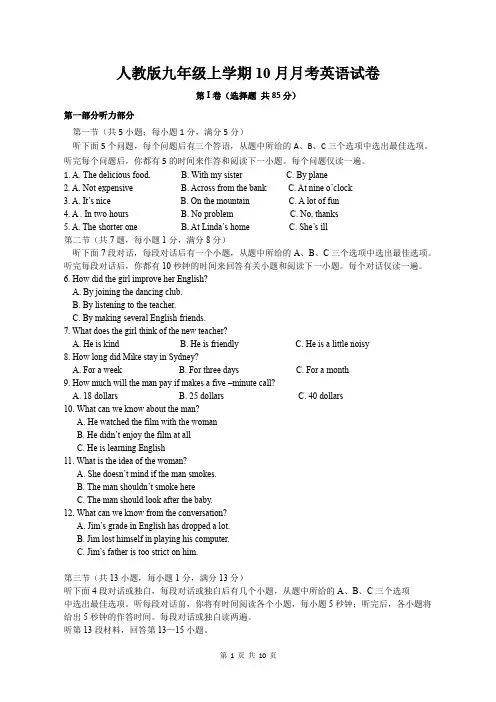
人教版九年级上学期10月月考英语试卷第I卷(选择题共85分)第一部分听力部分第一节(共5小题;每小题1分,满分5分)听下面5个问题,每个问题后有三个答语,从题中所给的A、B、C三个选项中选出最佳选项。
听完每个问题后,你都有5的时间来作答和阅读下一小题。
每个问题仅读一遍。
1. A. The delicious food. B. With my sister C. By plane2. A. Not expensive B. Across from the bank C. At nine o’clock3. A. It’s nice B. On the mountain C. A lot of fun4. A . In two hours B. No problem C. No, thanks5. A. The shorter one B. At Linda’s home C. She’s ill第二节(共7题,每小题1分,满分8分)听下面7段对话,每段对话后有一个小题,从题中所给的A、B、C三个选项中选出最佳选项。
听完每段对话后,你都有10秒钟的时间来回答有关小题和阅读下一小题。
每个对话仅读一遍。
6. How did the girl improve her English?A. By joining the dancing club.B. By listening to the teacher.C. By making several English friends.7. What does the girl think of the new teacher?A. He is kindB. He is friendlyC. He is a little noisy8. How long did Mike stay in Sydney?A. For a weekB. For three daysC. For a month9. How much will the man pay if makes a five –minute call?A. 18 dollarsB. 25 dollarsC. 40 dollars10. What can we know about the man?A. He watched the film with the womanB. He didn’t enjoy the film at allC. He is learning English11. What is the idea of the woman?A. She doesn’t mind if the man smokes.B. The man shouldn’t smoke hereC. The man should look after the baby.12. What can we know from the conversation?A. Jim’s grade in English has dropped a lot.B. Jim lost himself in playing his computer.C. Jim’s father is too strict on him.第三节(共13小题,每小题1分,满分13分)听下面4段对话或独白,每段对话或独白后有几个小题,从题中所给的A、B、C三个选项中选出最佳选项。
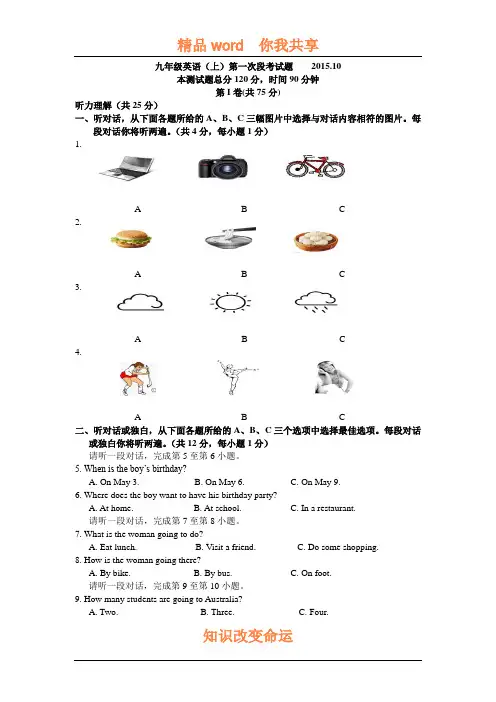
知识改变命运九年级英语(上)第一次段考试题 2015.10本测试题总分120分,时间90分钟第I 卷(共75分)听力理解(共25分)一、听对话,从下面各题所给的A 、B 、C 三幅图片中选择与对话内容相符的图片。
每段对话你将听两遍。
(共4分,每小题1分)1.A B C2.A B C3.A B C4.A B C二、听对话或独白,从下面各题所给的A 、B 、C 三个选项中选择最佳选项。
每段对话或独白你将听两遍。
(共12分,每小题1分)请听一段对话,完成第5至第6小题。
5. When is the boy’s birthday?A. On May 3.B. On May 6.C. On May 9.6. Where does the boy want to have his birthday party?A. At home.B. At school.C. In a restaurant.请听一段对话,完成第7至第8小题。
7. What is the woman going to do?A. Eat lunch.B. Visit a friend.C. Do some shopping.8. How is the woman going there?A. By bike.B. By bus.C. On foot.请听一段对话,完成第9至第10小题。
9. How many students are going to Australia?A. Two.B. Three.C. Four.10. What are they going to do there?A. Swim in the sea.B. Listen to music.C. Visit the beaches.请听一段对话,完成第11至第13小题。
11. How often does Steve play ball games a week?A. Twice a week.B. Three times a week.C. Four times a week.12. What does Steve do on Wednesday?A. Play volleyball.B. Go to the drum club.C. Does his homework.13. When does Steve watch the evening news?A. At 6 o’clock.B. At 7 o’clock.C. At 10 o’clock.请听一段独白,完成第14至第16小题。
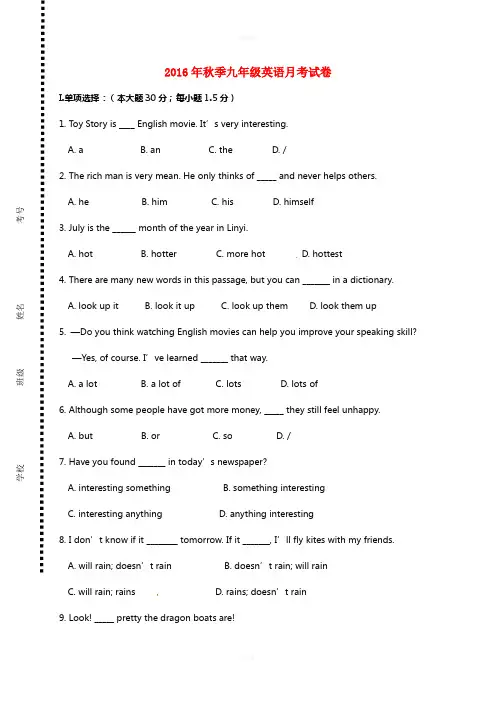
2016年秋季九年级英语月考试卷I.单项选择:(本大题30分;每小题1.5分) 1. Toy Story is ____ English movie. It ’s very interesting. A. a B. an C. the D. / 2. The rich man is very mean. He only thinks of _____ and never helps others. A. he B. him C. his D. himself 3. July is the ______ month of the year in Linyi. A. hot B. hotter C. more hot D. hottest 4. There are many new words in this passage, but you can _______ in a dictionary. A. look up it B. look it up C. look up them D. look them up 5. —Do you think watching English movies can help you improve your speaking skill? —Yes, of course. I’ve learned _______ that way. A. a lot B. a lot of C. lots D. lots of 6. Although some people have got more money, _____ they still feel unhappy. A. but B. or C. so D. / 7. Have you found _______ in today ’s newspaper? A. interesting something B. something interesting C. interesting anything D. anything interesting 8. I don ’t know if it ________ tomorrow. If it _______, I ’ll fly kites with my friends.A. will rain; doesn ’t rainB. doesn ’t rain; will rainC. will rain; rainsD. rains; doesn ’t rain9. Look! _____ pretty the dragon boats are!学校________________ 班级________ 姓名______________ 考号__________________________A. WhatB. What aC. HowD. How a10. Bill wonders ____________ next week.A. whether they will have a math testB. whether they have a math testC. if they have a math testD. that they will have a math test11.He felt tired, so he went and ____ down for a rest.A.lieB. lay C .lied D. laid12. The best way to learn new words is by ______ English magazines.A. readB. read sC. readingD. to read13. It’s ______ hard for him ______ understand spoken English.A. to…tooB. so… thatC. too…toD. very…that14. The girl in purple is new here, so _____ people know her.A. fewB. a fewC. littleD. a little15. My family has two dogs. One is white, ______ is black.A. otherB. anotherC. the otherD. others16. Not only my friends, but also I _______ interested in football and Messi is our favorite star.A. beB. amC. isD. are17. Aunt Lucy eats five meals a day. Now she has _______ more than six pounds.A. put onB. put upC. put offD. put away18. I find ______ difficult to learn English well without hard work.A. itB. thisC. thatD. those19. Whether or not you can learn English well depends ______ your learning habits.A. withB. byC. onD. at20. ____________ children there are in a family, ____________ their life will be.A. The less; the betterB. The fewer; the betterC. Fewer; richerD. More; poorerII.用所给动词的适当形式填空(本大题共10分;每小题1分)21.How can we ______________ (become) good learners?22.My classmates and I study for English tests by _________________ (read) the textbook.23.The police warn the terrorists(恐怖分子) ________________ (stop) the killing.24.Japan has refused _________________ (give) up evil and return to good.25.Do you often practice _______________ (speak) English after class?26.I _____________ (fall) in love with Hangzhou when I first went there.27.Listen! Someone ____________________ (sing) Life in Blossom.28. John thinks people will help him if he asks for help ___________ (polite).29. I like to eat in the restaurant, because it's clean, quiet and_________ (crowded).30. Jack !If you answer this question ____________(correct), you will get the first prize.III.根据句意用所给词的适当形式填空(本大题共8分;每小题1分)31.It’s too hard to understand ________________ (speak) English.32.Sometimes I can’t get the _____________________ (pronounce) right when I read Englishmagazines.33.Light music will not make you get ______________ (boring).34.When you read English, don’t read word by word. Just read ________________ (quick) to get themain ideas at first.35. I think math is the ________________ (hard) of all subjects.36. There are many __________________ (tradition) folk stories about the Mid-Autumn festival.37.Sometimes it’s dangerous to talk with a ________________ (strange).38.A good student always treats everyone with with kindness and _________________ (warm). IV.选词填空(本大题共10分;每小题1分)只需将答案代号填入语篇后面的横线上即可。
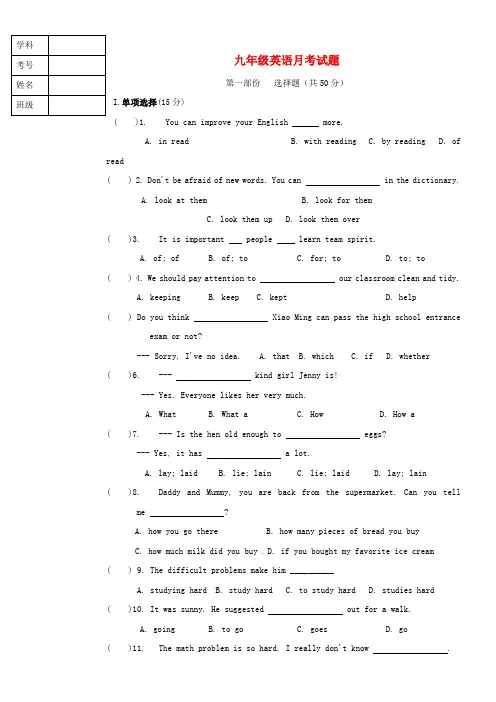
九年级英语月考试题 第一部份 选择题(共50分) I.单项选择(15分)( )1. You can improve your English more. A. in read B. with reading C. by reading D. of read ( ) 2. Don't be afraid of new words. You can in the dictionary.A. look at themB. look for themC. look them upD. look them over( )3. It is important people learn team spirit. A. of; of B. of; to C. for; to D. to; to( ) 4. We should pay attention to our classroom clean and tidy.A. keepingB. keepC. keptD. help( ) Do you think Xiao Ming can pass the high school entranceexam or not?--- Sorry, I've no idea. A. that B. which C. if D. whether( )6.--- kind girl Jenny is! --- Yes. Everyone likes her very much.A. WhatB. What aC. HowD. How a( )7. --- Is the hen old enough to eggs?--- Yes, it has a lot.A. lay; laidB. lie; lainC. lie; laidD. lay; lain( )8. Daddy and Mummy, you are back from the supermarket. Can you tellme ?A. how you go thereB. how many pieces of bread you buyC. how much milk did you buyD. if you bought my favorite ice cream( ) 9. The difficult problems make him __________A. studying hardB. study hardC. to study hardD. studies hard( )10. It was sunny. He suggested out for a walk.A. goingB. to goC. goesD. go( )11. The math problem is so hard. I really don't know .学科考号姓名班级A. how to do itB. how to doC. what to do itD. how do( )12.—I don’t have a partner to practice English________.—Why not join an English language club to practice________?A./;speaking B.with;to speakC./;to speak D.with;speaking( )13.You’ll find________ easy to learn it well.A.that B.its C.it D.thi s( )14. We are all ______ about the ______ movie.A. exciting; excitingB. exciting; excitedC. excited; exciting( ) me, can you tell me where I can post the letter?--- Sorry, I am new here.A. SuggestB. RequestC. PardonD. TellII补全对话(10分)从方框当选出适当的句子,完成对话。
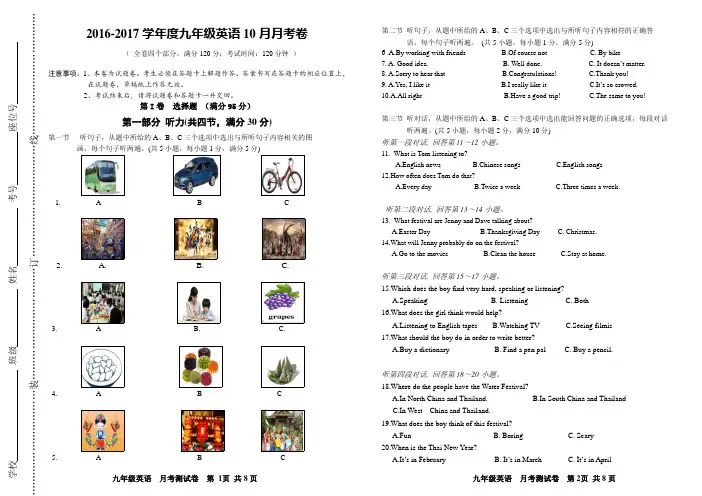
九年级英语月考测试卷第1页共8页九年级英语月考测试卷第2页共8页2016-2017学年度九年级英语10月月考卷(全卷四个部分;满分120分;考试时间:120分钟)注意事项:1、本卷为试题卷。
考生必须在答题卡上解题作答。
答案书写在答题卡的相应位置上,在试题卷,草稿纸上作答无效。
2、考试结束后,请将试题卷和答题卡一并交回。
第I 卷选择题(满分95分)第一部分听力(共四节,满分30分)第一节听句子,从题中所给的A、B 、C 三个选项中选出与所听句子内容相关的图画,每个句子听两遍。
(共5小题,每小题1分,满分5分)1.A BC2. A. B.C.3.A B.C.4.ABC5.A B C第二节听句子,从题中所给的A 、B 、C 三个选项中选出与所听句子内容相符的正确答语,每个句子听两遍。
(共5小题,每小题1分,满分5分)6.A.By working with friends B.Of course not C.By bike7.A.Good idea. B.Well done. C.It doesn’t matter.8.A.Sorry to hear that B.Congratulations! C.Thank you!9.A.Yes,I like it B.I really like it C.It’s so crowed.10.A.All right B.Have a good trip! C.The same to you!第三节听对话,从题中所给的A 、B 、C 三个选项中选出能回答问题的正确选项,每段对话听两遍。
(共5小题,每小题2分,满分10分)听第一段对话,回答第11~12小题。
11.What is Tom listening to?A.English newsB.Chinese songsC.English songs 12.How often does Tom do that?A.Every dayB.Twice a weekC.Three times a week.听第二段对话,回答第13~14小题。
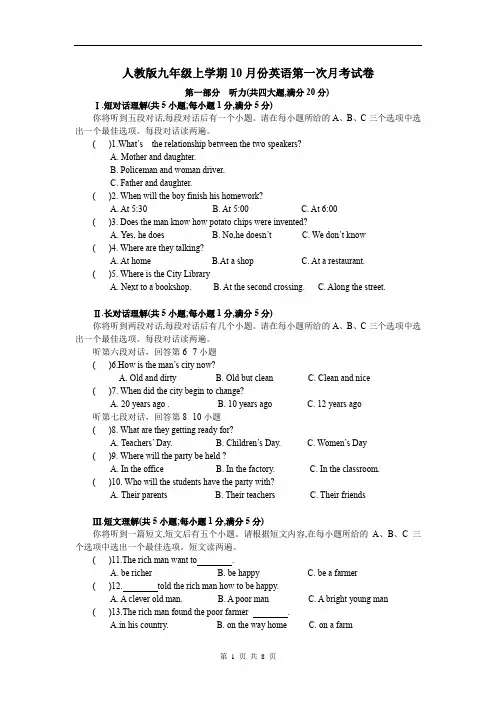
人教版九年级上学期10月份英语第一次月考试卷第一部分听力(共四大题,满分20分)Ⅰ.短对话理解(共5小题;每小题1分,满分5分)你将听到五段对话,每段对话后有一个小题。
请在每小题所给的A、B、C三个选项中选出一个最佳选项。
每段对话读两遍。
( )1.What’s the relationship between the two speakers?A. Mother and daughter.B. Policeman and woman driver.C. Father and daughter.( )2. When will the boy finish his homework?A. At 5:30B. At 5:00C. At 6:00( )3. Does the man know how potato chips were invented?A. Yes, he doesB. No,he doesn’tC. We don’t know( )4. Where are they talking?A. At homeB.At a shopC. At a restaurant.( )5. Where is the City LibraryA. Next to a bookshop.B. At the second crossing.C. Along the street.Ⅱ.长对话理解(共5小题;每小题1分,满分5分)你将听到两段对话,每段对话后有几个小题。
请在每小题所给的A、B、C三个选项中选出一个最佳选项。
每段对话读两遍。
听第六段对话,回答第6--7小题( )6.How is the man’s city now?A. Old and dirtyB. Old but cleanC. Clean and nice( )7. When did the city begin to change?A. 20 years ago .B. 10 years agoC. 12 years ago听第七段对话,回答第8--10小题( )8. What are they getting ready for?A. Teachers’ Day.B. Children’s Day.C. Women’s Day( )9. Where will the party be held ?A. In the officeB. In the factory.C. In the classroom.( )10. Who will the students have the party with?A. Their parentsB. Their teachersC. Their friendsⅢ.短文理解(共5小题;每小题1分,满分5分)你将听到一篇短文,短文后有五个小题。
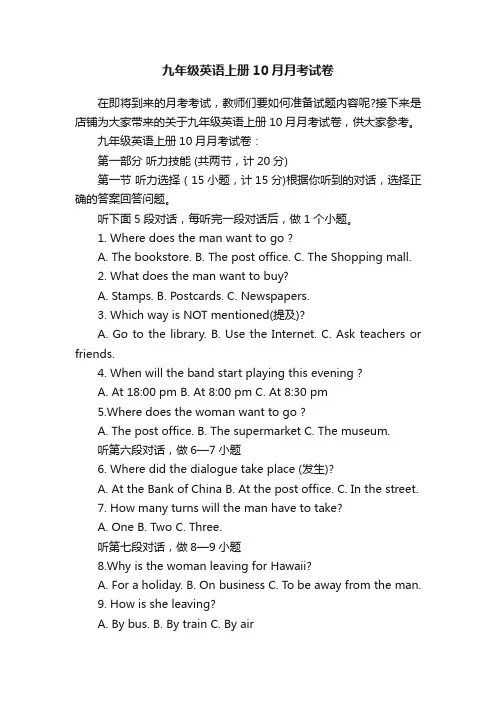
九年级英语上册10月月考试卷在即将到来的月考考试,教师们要如何准备试题内容呢?接下来是店铺为大家带来的关于九年级英语上册10月月考试卷,供大家参考。
九年级英语上册10月月考试卷:第一部分听力技能 (共两节,计20分)第一节听力选择 ( 15小题,计15分)根据你听到的对话,选择正确的答案回答问题。
听下面5段对话,每听完一段对话后,做1个小题。
1. Where does the man want to go ?A. The bookstore.B. The post office.C. The Shopping mall.2. What does the man want to buy?A. Stamps.B. Postcards.C. Newspapers.3. Which way is NOT mentioned(提及)?A. Go to the library.B. Use the Internet.C. Ask teachers or friends.4. When will the band start playing this evening ?A. At 18:00 pmB. At 8:00 pmC. At 8:30 pm5.Where does the woman want to go ?A. The post office.B. The supermarketC. The museum.听第六段对话,做6—7小题6. Where did the dialogue take place (发生)?A. At the Bank of ChinaB. At the post office.C. In the street.7. How many turns will the man have to take?A. OneB. TwoC. Three.听第七段对话,做8—9小题8.Why is the woman leaving for Hawaii?A. For a holiday.B. On businessC. To be away from the man.9. How is she leaving?A. By bus.B. By trainC. By air听第八段对话,做10—12小题10. What does the man need?A. A taxiB. A bookC. A bag.11. When will the man leave home?A. At 2:30B. At 3:00C. At 3:3012. What does the man want the driver to do?A. Drive carefully.B. Carry his bags.C. Be on time.听第九段对话,做13—15小题13. Which bus goes fastest?A. No.13B. No. 14C. No.3014. Which bus did the man suggest the woman take?A. No.13B. No.18C. No.3015.Which bus did the woman take at last ?A. No.30B. No.18C. No.40第二节笔录要点 ( 5小题,计5分)根据你所听到的内容,填写下面的表格,每空不超过3个单词。
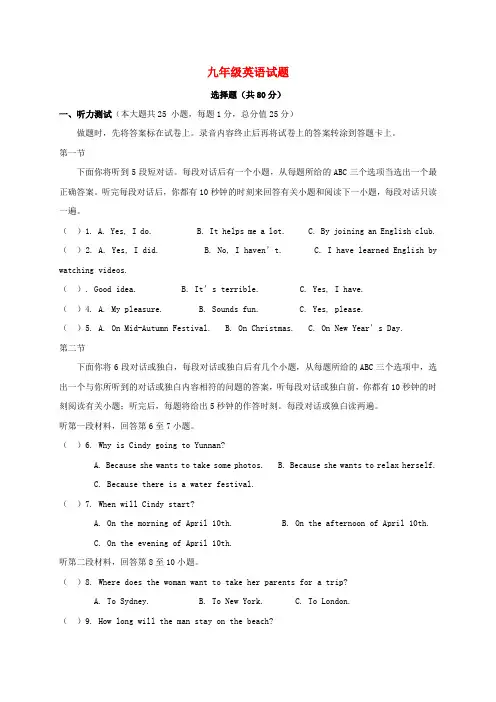
九年级英语试题选择题(共80分)一、听力测试(本大题共25 小题,每题1分,总分值25分)做题时,先将答案标在试卷上。
录音内容终止后再将试卷上的答案转涂到答题卡上。
第一节下面你将听到5段短对话。
每段对话后有一个小题,从每题所给的ABC三个选项当选出一个最正确答案。
听完每段对话后,你都有10秒钟的时刻来回答有关小题和阅读下一小题,每段对话只读一遍。
()1. A. Yes, I do. B. It helps me a lot. C. By joining an English club.()2. A. Yes, I did. B. No, I haven’t. C. I have learned English by watching videos.(). Good idea. B. It’s terrible. C. Yes, I have.()4. A. My pleasure. B. Sounds fun. C. Yes, please.()5. A. On Mid-Autumn Festival. B. On Christmas. C. On New Year’s Day.第二节下面你将6段对话或独白,每段对话或独白后有几个小题,从每题所给的ABC三个选项中,选出一个与你所听到的对话或独白内容相符的问题的答案,听每段对话或独白前,你都有10秒钟的时刻阅读有关小题;听完后,每题将给出5秒钟的作答时刻。
每段对话或独白读两遍。
听第一段材料,回答第6至7小题。
()6. Why is Cindy going to Yunnan?A. Because she wants to take some photos.B. Because she wants to relax herself.C. Because there is a water festival.()7. When will Cindy start?A. On the morning of April 10th.B. On the afternoon of April 10th.C. On the evening of April 10th.听第二段材料,回答第8至10小题。
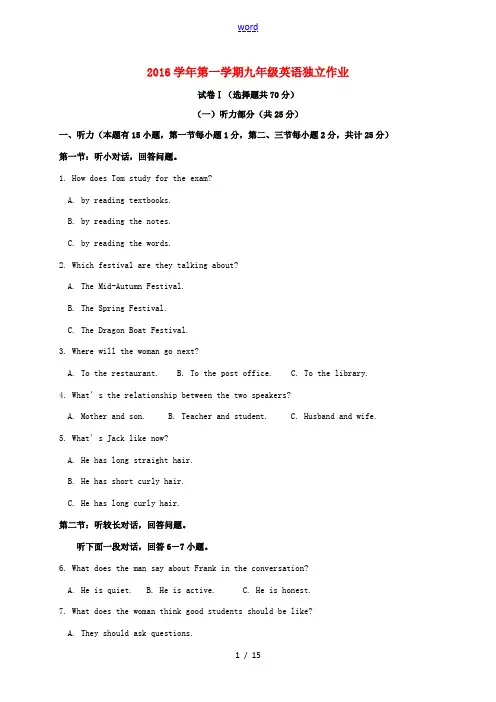
2016学年第一学期九年级英语独立作业试卷Ⅰ(选择题共70分)(一)听力部分(共25分)一、听力(本题有15小题,第一节每小题1分,第二、三节每小题2分,共计25分)第一节:听小对话,回答问题。
1. How does Tom study for the exam?A. by reading textbooks.B. by reading the notes.C. by reading the words.2. Which festival are they talking about?A. The Mid-Autumn Festival.B. The Spring Festival.C. The Dragon Boat Festival.3. Where will the woman go next?A. To the restaurant.B. To the post office.C. To the library.4. What’s the relationship between the two speakers?A. Mother and son.B. Teacher and student.C. Husband and wife.5. What’s Jack like now?A. He has long straight hair.B. He has short curly hair.C. He has long curly hair.第二节:听较长对话,回答问题。
听下面一段对话,回答6-7小题。
6. What does the man say about Frank in the conversation?A. He is quiet.B. He is active.C. He is honest.7. What does the woman think good students should be like?A. They should ask questions.B. They should pay attention in class.C. They should try to use what they’ve learned.听下面一段对话,回答8-10小题。
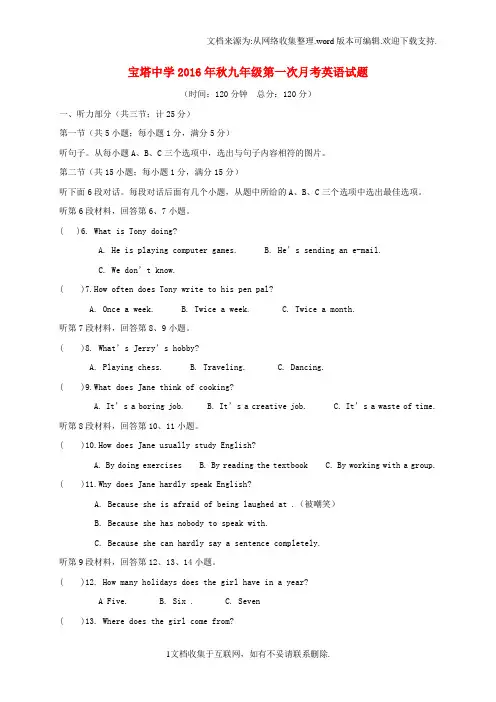
宝塔中学2016年秋九年级第一次月考英语试题(时间:120分钟总分:120分)一、听力部分(共三节;计25分)第一节(共5小题;每小题1分,满分5分)听句子。
从每小题A、B、C三个选项中,选出与句子内容相符的图片。
第二节(共15小题;每小题1分,满分15分)听下面6段对话。
每段对话后面有几个小题,从题中所给的A、B、C三个选项中选出最佳选项。
听第6段材料,回答第6、7小题。
( )6. What is Tony doing?A. He is playing computer games.B. He’s sending an e-mail.C. We don’t know.( )7.How often does Tony write to his pen pal?A. Once a week.B. Twice a week.C. Twice a month.听第7段材料,回答第8、9小题。
( )8. What’s Jerry’s hobby?A. Playing chess.B. Traveling.C. Dancing.( )9.What does Jane think of cooking?A. It’s a boring job.B. It’s a creative job.C. It’s a waste of time. 听第8段材料,回答第10、11小题。
( )10.How does Jane usually study English?A. By doing exercisesB. By reading the textbookC. By working with a group. ( )11.Why does Jane hardly speak English?A. Because she is afraid of being laughed at .(被嘲笑)B. Because she has nobody to speak with.C. Because she can hardly say a sentence completely.听第9段材料,回答第12、13、14小题。
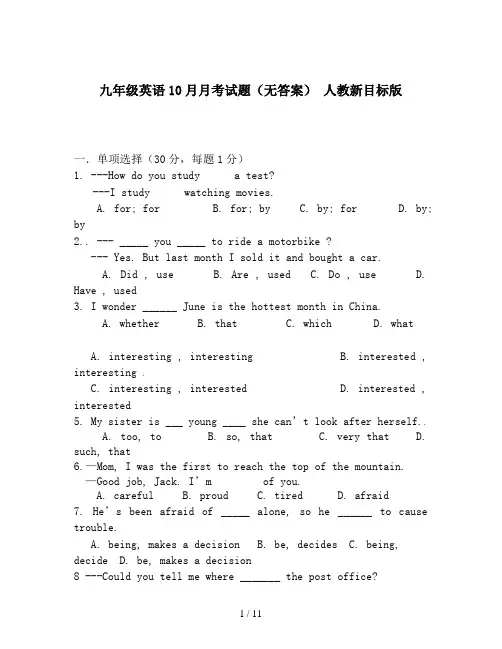
九年级英语10月月考试题(无答案)人教新目标版一.单项选择(30分,每题1分)1. ---How do you study a test?---I study watching movies.A. for; forB. for; byC. by; forD. by; by2.. --- _____ you _____ to ride a motorbike ?--- Yes. But last month I sold it and bought a car.A. Did , useB. Are , usedC. Do , useD. Have , used3. I wonder ______ June is the hottest month in China.A. whetherB. thatC. whichD. whatA. interesting , interestingB. interested , interestingC. interesting , interestedD. interested , interested5. My sister is ___ young ____ she can’t look after herself.A. too, toB. so, thatC. very thatD. such, that6.—Mom, I was the first to reach the top of the mountain.—Good job, Jack. I’m of you.A. carefulB. proudC. tiredD. afraid7. He’s been afraid of _____ alone, so he ______ to cause trouble.A. being, makes a decisionB. be, decidesC. being, decideD. be, makes a decision8 ---Could you tell me where _______ the post office?--- ________? I didn’t hear it clearly.A. to find, PardonB. can I find, SorryC. can I find,Pardon D. find, Excuse me9. ______ cold day! I must put on more clothes.A. How aB. What aC. WhatD. How10. ----Don’t eat too much. You’re too fat.----Yes. I have ______ 5 pounds now.A. put upB. put downC. put onD. putout11. —Excuse me, could you tell me where I can buysome ?— Sure. There’s a post office at the first crossing.A. snacksB. stampsC. umbrellasD. bananas12. --- My sister is still afraid of the dark, _____she isalready 15 years old.A butB orC soD even though13. Our geography teacher said that the earth__________around the sun.A. wentB. goingC. to goD. goes14. Jimmy is very helpful. I stay with him, Ilike him.A. The longer; the mostB. The longest; the mostC. The longer; the moreD. The longest; the more15. --Do you often e-mail your friends?--- I _________e-mail my friends in the past, butnow I like doing it.A. didn`t used toB. don`t usedto C. didn`t use to D. don`t use to16.I enjoyplaying soccer and I am the soccer team .A. / , inB. the , onC. a , onD. / , on17. ----Jack used to ________ to school.----Yes, but now he’s used to ________the bus.A. walk, takeB. walking, takeC. walk,taking D. walking, taking18. He doesn`t dare the school rules .A. breakB. to breakC. breakingD. breaks19. It is______ cold today, but I still have to finish ______homework.A. too much; too muchB. much too; much tooC. too much ;much tooD. much too; too much20..Every year a lot of tourists travel to Hainan , becauseit’s island .A. so a beautifulB. so beautifulC. such a beautifulD. a such beautiful21.It’s to work out the problem .There is no need toask your teacher for help .A. enough easyB. easy enoughC. hard enoughD. enough hard22. Jack suggested ________videos, but Tom advised us_________party games.A. to watch, to playB. to watch, playingC. watching, playingD. watching, to play23. Do you know _________?A. who is heB. if does sheoften get good gradesC. she used to be short and shyD. what willthey do this weekend24. — James, can you tell me ?—Paul? I haven’t seen him for years. He used to bea shy and quiet boy.A. what is Paul likeB. what Paul is likeC. what does Paul likeD. what Paul likes25.She used late. But now she is used early.A. to get up, to get upB. to get up, to getting upC. to getting up, to get upD. to getting up, togetting up26.It’s been three years we last saw our primaryschool classmates.A.sinceB. forC. untilD. after27.She is girl from Asia.A. a 18-year-oldB. an 18-year-oldC. an 18-years-old D. a 18-years-old28.—Many students don’—I think they should ask the teacher for help.A.29.I didn’t use to be popular in school, but now I get attention everywhere I go.A.tons ofB. veryC. much tooD. a lot30.Though he is at home, he doesn’t feel for he has many things to do.A.alone, lonelyB. lonely, aloneC. alone, aloneD .lonely, lonely二.完形填空(15分,每小题1分)( )31. A. ago B. later C. earlier D. before( )32. A. active B. lucky C. serious D. careful( )33. A. told B. made C. invited D. allowed( )34. A. suddenly B. gladly C. neatly D. strongly( )35. A. later B. earlier C. quicker D. slower( )36. A. After B. As C. If D. When( )37. A. room B. table C. friend D. seat( )38. A. talk B. show C. party D. movie( )39. A. us B. everybody C. me D. them( )40. A. pleased with B. worried about C. excited about D. happy at( )41. A. taken B. caught C.lost D. missed( )42. A. During B. Although C. While D. Because( )43. A. could B. would C. can D. will( )44. A. hardly B. almost C. never D. only( )45. A. greet B. speak C. say D. read三.阅读理解(共30分,每题2分)ADo you always understand the instructions(说明) on a bottle of medicine? Here’s one for John. John is twelve years old. He had a bad cold and coughed day and night. He went to see a doctor and was given some cough medicine. Please read the following instructions and if you can( )46. People who ____________ can take this medicine.A. have a feverB. have a cold and coughC. have a headacheD. can`t sleep at night( )47. We should ___________ before we use this medicine.A. shake the medicine wellB. have mealsC. do some sportsD. sleep( )48. John should take ____________ a day.A. 2 teaspoonfulsB. 3 teaspoonfulsC. 4 teaspoonfulsD. 1 teaspoonful( ) 49. The medicine should be kept _________________.A. in a fridgeB. in warm placeC. in anyplace D. in the hospital( ) 50. John should _________ after December 1st, 2014.A. use the medicineB. stop using the medicineC. see a doctorD. read the instructionsBWhat is your favorite holiday? Here are some students’opinions.Sandy from Taiwan says:My favorite holiday is the Mid-Autumn festival. I alwaysvisit my grandfather and grandmother, and we always go to thesame restaurant on the mountain to hold jubilation. At night,we always have a barbecue, and watch the moon together. Ienjoy it a lot.Yagna from India says:My favorite day is Deepavali(屠妖节), which is alsocalled Festival of Lights. People do some cleaning at homeand light their oil lamps to thank for the defeat of the badking. To celebrate it, we also eat sweets and delicious food,wear new clothes, and give presents to our friends andrelatives.Pat from Thailand says:My name is Pat. My favorite holiday is Songkran. It takesplace from the 13th to 15th of April. On the holiday peoplepour water on each other. It is a lot of fun. People also buynew clothes and they have big parties.51. What is Sandy’s favorite holiday?A. The Mid-Autumn festival.B. New Year's Day.C. Deepavali.D. Songkran.52. The underlined word “jubilation” is closest in meaningto “________”.A. hopeB. celebrationC. presentD. exercise53. What does the underlined word “Songkran” probably meanin Chinese?A. 音乐会B. 新年C. 中秋节D.泼水节54. In order to celebrate Deepavali, we can ________.A. eat sweets and delicious foodB. weal new clothesC. give presents to othersD. all of the above55. Which of the following is TRUE?A. Pat from Thailand like Deepavali(屠妖节) best.B. Sandy can celebrate her favorite festival by pouringwater on each other.C. Songkran takes place from the 13th to 15th of April.D. Sandy always go to different restaurant on the mountainto spend the Mid-Autumn festival.DA smile will tell people around you that you are a kind and friendly person. However, many people don’t smile because they think they ugly teeth. For example, one of my classmates, Mile, doesn’t have very nice teeth, so that is why he seldom opens his mouth. he even says that he has lost confidence because of his teeth. So it is very important forus to look after our teeth. In fact, a lot of people have this problem. Some people inherit teeth problems from their parents, while others’ teeth are damaged because of bad habits, like heavy smoking, eating too much sugar or not brushing teeth often. If your teeth are in bad shape, you should see a dentist and ask for help. They can help improve your teeth and tell you how to take care of then.Smiling can help you to feel more confident and make other people think of you as a more friendly person. If you want to keep healthy, you should not only smile but also laugh. An Indian doctor called Kataria said that young children should laugh about 300 times a day, while adults should laugh between 7 and 15 times a day. So please take this chance to smile and laugh now!56. What has made Mike lose his confidence?A. His bad habit.B. His bad teeth.C. Not smiling.D. Eating too much sugar.57. Many people don’t smile because .A. they don’t like smilingB. they think they are uglyC.their teeth are not beautifulD. they can’t open their mouths58. What can a dentist do according to the passage?A. A dentist can tell you how to improve your bad teeth.B. A dentist can help you to take care of your bad teeth.C. A dentist can tell you how to brush your teeth.D. Both A and B.59. If you want to keep healthy, you had better .A. not smile oftenB. laugh all the timeC. neither smile nor laughD. smile and even laughoften60. How many times should a child laugh every day in doctor Kataria’s opinion?A. Either 300 or 30 times a day.B. Between 7 and15 times a day.C. Around 300 times a day.D. Only 30 times aday.四.根据汉语提示填写一个适当的单词,使句子意思和语法正确(5分,每小题0.5分)。
2015--2016学年度第一学期十月质量检测九年级英语试卷(时间:120分钟满分:120分) 成绩第I卷(共65分)听力部分I.听对话,选答案(共15小超,计15分)笫一节:听下面10段对话,每段对话后有一个问题,读两遍,请根据每段对话的内容和后面的问题,从所给的三个选项中选出最恰当的一项.1. A. This Sunday. B. Next Saturday. C. This Saturday.2. A. She is playing. li. She is sleeping. C. She is listening to music.3. A. Her grandmother and grandfather. B. Her mother and father.C. Her sister and brother.4. A. In n hospital. B. At home. C. At school.5. A. Larry. B. John. C. Linda.6. A. A chicken hamburger. B. A pork hamburger. C. A beef hamburger.7. A. It’s warm. B. It's cool. C. It’s cold.8. A. A singer. B. A pilot. C. A dancer.9. A. Between the post office and the supermarket.B. Between the post office and the book shop.C. Between the book shop and the supermarket.10. A. For 1 days. B. For 3 days. C. For 2 days.笫二节:听下面两段对话,每段对后有几道小题.请报据每段对话的内容和后面的问题,从所给的三个选项中选出最恰当的一项,每段对话读两遍。
九年级英语十月份月考试卷初三英语本试卷分卷Ⅰ和卷Ⅱ两部分。
卷Ⅰ为选择题,卷Ⅱ为非选择题。
试卷120分,考试时间90分钟。
卷Ⅰ(选择题,共90分)听力部分(第一节)(30分)Ⅰ.听句子,选出句子中所包含的信息。
(共6小题,每小题1分,计6分)1. A. He likes smoking. B. Smoking is his favorite.C. He doesn’t smoke now.2. A. She likes playing computer games. B. She likes playing the piano.C. Her piano doesn’t work.3. A. Sleep without the light. B. Sleep with the light off.C. Sleep with the light on.4. A. Yang Li is in Paris. B. I’m in Paris.C. I wrote a letter.5. A. a brave girl B. a math lessonC. be afraid6. A. Kate runs slowly. B. The match will begin very soon.C. The match is over.Ⅱ.听句子,选出该句的最佳答语。
(共6小题,每小题1分,计6分)7. A. Yes, I did. B. I took a bus. C. I remember.8. A. The same to you. B. You, too. C. Thanks.9. A. Yes, please. B. No, I’m not. C. And you?10. A. Spiders. B. Yes, I like it. C. It’s interesting.11. A. Yes, I do. B. No. Music class. C. Gym class.12. A. No, I haven’t. B. Yes, I did. C. I don’t know.Ⅲ.听对话和问题,选择适当的选项。
九年级英语上学期10月月考试题人教新目标版-精选资料(第一部分)听力部分(30分)一、听短对话,回答问题。
(共5小题,计10分)听下面5段对话。
每段对话后有一个小题。
从题中所给的A.B.C三个选项中选出最佳选项,并标在试题的相应位置。
听完每段对话后,你都有l0秒钟的时间来回答有关小题和阅读下一小题。
每段对话仅读一遍。
1. What are they talking about?A.Rain.B. Weather.C. Umbrella.2. Who won the first prize in the English speech competition?A.John and Mike.B. Rose and John.C. Mike and Rose.3. How much will the man pay for the tickets?A. $60.B. $240.C. $180.4. What did Pierre use to be like?A. He was a little shy and quiet.B. He was not shy and quiet.C. He was quite clever but a little shy.5. How does the woman improve her speaking?A. By reading aloud in the morning.B. By talking with foreign teachers.C. By practicing spoken English with friends.二、听较长对话,回答问题。
(共6小题,计12分)听下面一段较长的对话,回答第6~8题。
现在,你有l0秒钟的时间阅读这两题。
6. How long did the boy use to stay under the water?A. Twenty minutes.B. Two hours.C. Three hours.7. How many hours can the girl stay under the water longer than the boy?A. OneB. TwoC. Three8. What competition will they have next weekend?A. SwimmingB. DivingC. Driving听下面一段较长的对话,回答第9~11题。
鹿阜中学2015--2016学年度上学期九年级10月月考英语试卷(本卷为昆明市中考题型仿卷,考试时间120分钟,满分120分)第一部分:听力(共四节,满分30分)()1.C.()2.A. .C,()3.( ) .( ) 5. A . A man w anted to steal Hou Yu ‘s magic medicine.B. A man wanted to eat Hou Yu ‘s magic medicine.C. A man wanted to eat Chang’e‘s magic medicine.( ) 6. A. What do you study English?B. How do you study English?C. When do you study English?( )7. A.I wonder They’ll have the races again next year.B. I wonder whether June is a good time to visit Hong Kong.C. I believe that April is the hottest month in Thailand.第二节:听句子,选出恰当的应答语,注意听两遍。
(每小题1分,共7 分)( )8. A. Yes, please. B. Yes, I’d love. C. Yes, I do.( )9. A. Yes, I haven’t. B. Yes, I have. C. No, I have.( )10. A. English . B. physic C. country music.( )11. A. For two days. B. Yes, he does. C. Yes, it is.( )12.A. Yes ,please. B. No, excuse. C. Walk along the road and right.( ) 13. A. Yes, I’d love to. B. No problem. C. Never mind.( ) 14. A. Halloween B. April Fool’s Day C. Mother’s Day第三节:听对话及问题,选择正确答案,注意听两遍。
(每小题1分,共6分)( ) 15. A. by making flashcards. B. by working with friends.C. by listening to tapes.( ) 16. A. Lantern Festival. B. Spring Festival. C. Dragon Boat Festival. ( ) 17. A. In a library. B. In a supermarket. C. In a restaurant.( ) 18. A. He’d like to visit somewhere exciting.B. I ’d like to visit somewhere relaxing.C. She’d like to visit somewhere quiet.( ) 19. A. Museum. B. Art C. School( ) 20.A. Because it is too noisy. B. Because it is very cheap.C. Because it is too expensive.第四节:听短文,根据短文内容回答问题,注意听三遍。
(每小题2分,共10分)( ) 21. How often do the students have a special day at their school?A. They always have a special day to help others.B. They sometimes have a special day to help others .C. They never have a special day to help others.( ) 22. Where did the students go last year?A. old people’s home.B. old people’s club.C. children’s home.( ) 23. What does the author(作者)want to be when he is older?A. a nurseB. a teacherC. a player( ) 24. who is the aut hor’s friend?A. Tian GeB. TinaC. Tommy( ) 25. How do many students usually feel on Friday afternoon?A. Many students are sleepy.B. Many students stay at home to play computer.C. Many students go to school to study.第二部分:英语知识运用(共二节,满分30分)第一节:单项填空 (每小题1分,共20分)( ) 26.--- do you study English? --- By making flashcards.A. HowB. WhereC. WhenD. Why( ) 27. ---What about a diary in English ?A. keepB. to keepC. keptD. keeping( ) 28. Mei thinks that English movies is a good way to learnEnglish well.A. watchB. watchedC. watchingD. watches( ) 29. Have you ever studied listening to tapes?A. forB. toC. onD. by( ) 30. The old man lives on floor.A. twoB. the secondC. secondD. twice( ) 31. I believe that April is the month of the year in Chiang Mai.A. hotestB. hottestC. hotterD. More hoter( ) 32. I found seeing action movies is very ______ . They make me ______.A. exciting;excitedB. excited; excitingC. exciting; boringD.bored; excited( ) 33. Easter is on a Sunday March 22nd April 25th.A. between ...andB. both... andC. from ...toD. either....or( ) 34. Let’s write them _____ before we forget the English words.A. downB. onC. toD. With ( ) 35. I want to send an E-mail to my friend. Can you tell me ___ to do it?A. howB. whatC. whyD. whether( ) 36. I won’t go there alone, and I’ll take _________ wants to go.A. anyoneB. whoC. whoeverD. what ( ) 37. The little girl often makes her mother tell her .A. something interestingB. anything interestingC. interesting somethingD. interesting anything( ) 38. The weather in Kunming is very good, not hot in Summer and not cold in Winter, so Kunming is called Spring City. There are ___________people to travel to Kunming every year.A. eight thousandsB. thousand ofC. thousands ofD. eight thousands of( ) 39. Many parents can’t send their children to school their families are very poor.A. althoughB. soC. becauseD. but( ) 40. I want to learn more about English to improve my skills.A. speaking; spokenB. speaking; speakingC. spoken; speakingD. spoken; spoken( ) 41. I f you don’t know how to spell new words, please__ in dictionary.A. look them upB. hand them upC. put them upD. call them up( ) 42.Jenny doesn’t want to go swimming because she’s gettinginto water.A. good atB. angry withC. afraid ofD. used to( ) 43. --- The dress is so beautiful. Do you like it ?--- Yes. But it costs an arm and a leg and I haven’t enough money with me.A. it’s too expensiveB. it’s very cheapC. it doesn’t fit meD. it’s too big for me( ) 44. --- The month exams are coming soon.--- Yes, I have ants in my pants.A.我有热锅上的蚂蚁。